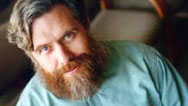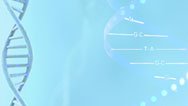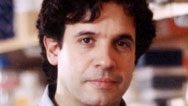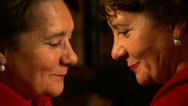
Public Genomes
Many people are paying to have their DNA tested. Others are sharing their genomes on the Internet. Are they crazy? Airing August 18, 2009 at 9 pm on PBS Aired August 18, 2009 on PBS
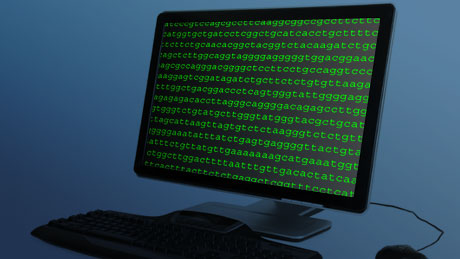
Program Description
Transcript
Public Genomes
PBS Airdate: August 18, 2009
NEIL DeGRASSE TYSON: Hi, I'm Neil deGrasse Tyson, your host of NOVA scienceNOW.
It seems like every week, scientists uncover more secrets of our D.N.A., revealing how our genetic code can help shape and influence our lives. And for some, this is scary, raising fears that insurance companies or employers might see our genetic profile and hold it against us.
(As Bureaucrat): Well, Mr. deGrasse Tyson, I've seen your genetic profile, and it's not pretty. In fact, you're much too much of a genetic risk for us.
But some say that knowing our genetic risk for disease will actually lead us to longer, healthier lives.
(As Doctor): Well, Neil, I've reviewed your genome. Here are my recommendations. And we've prepared a bottle of vitamins specially for you.
Well, thank you!
(As Doctor): Live long and prosper.
So what can genetic testing actually tell us about our chances for a long and healthy life? And will that knowledge help us or hurt us?
It's Time Magazine's invention of the year. No, it's not the electric car or the bionic hand. It's not even Hulu. It's the personal D.N.A. test.
A bunch of new companies are claiming they can read your D.N.A. and tell you all kinds of things about yourself. And it seems everybody wants to know what might be hidden in their genes. Larry King, the founders of Google, supermodel Naomi Campbell, and Ivanka Trump...they've all signed up to get their D.N.A. done.
But what can these tests really tell you about you?
To find out, I got one of the tests. There was just one thing I needed to do.
Spit.
ELISSA LEVIN (Navigenics, Inc.): You have agreed to provide us with a saliva sample, and...
NEIL DeGRASSE TYSON: Spit?
ELISSA LEVIN: Spit, correct.
NEIL DeGRASSE TYSON: All I had to do was spit into a tube and send it to a lab in California, where they extracted my D.N.A.
D.N.A. is made of long strings of four chemicals, best known by their initials, A, C, G and T. The six billion letters in a human genome encode the instructions for building our bodies and keeping them running.
Everybody's D.N.A. is mostly the same. Here and there, a letter or more will be different.
DIETRICH STEPHAN (Navigenics, Inc.): Those subtle variations are what make you and I unique and different. But, it's also what predisposes individuals, subtly, to these common diseases.
NEIL DeGRASSE TYSON: This lab compared the letters of my D.N.A. to the letters of people who have some common diseases, and then predicted my chances of my getting sick.
That would tell me I'm at a higher risk than the population, on average?
They said I had less than a 5 percent chance of getting Alzheimer's disease, but more than a 25 percent chance of getting diabetes or having a heart attack in my lifetime.
I wondered what all these percentages really meant. So I asked my friend, Steven Pinker, Harvard professor of psychology. He had taken the test and got back an even longer list.
Here's one of my favorites.
STEVE PINKER: ...said I have a gene that gives me double the risk of baldness. My risk, based on this single gene, would be 80 percent.
NEIL DeGRASSE TYSON: An 80 percent chance of being bald? Steve's got more hair than your average rock star.
STEVE PINKER: Oh, I get stopped all the time with, "Gee, you look like Jimmy Page...," and Robert Plant and Roger Daltry.
NEIL DeGRASSE TYSON: He was even featured on mulletlovers.com as the...
STEVE PINKER: ...stud mullet.
NEIL DeGRASSE TYSON: So what's up? The invention of the year, a personal D.N.A. test telling Steve Pinker he should be bald?
STEVE PINKER: What does it mean that I have an 80 percent risk of baldness? I clearly have a zero percent risk of baldness.
NEIL DeGRASSE TYSON: And if that seems so wrong, what about the disease risks I was given?
Well, a lot of experts say they're about as accurate as Steve's baldness prediction.
RUDY TANZI: The fact that they're telling people "percent chance" of getting a disease in their life, right now, it's laughable.
NEIL DeGRASSE TYSON: We know that a few diseases, like sickle cell anemia and Huntington's disease, are caused by one faulty gene, and D.N.A. tests do a good job predicting them. But many geneticists, like Rudy Tanzi, say that for most common illnesses, the tests still aren't very useful for prediction.
RUDY TANZI: I don't think it's possible, no matter how much money you spent right now, with any direct D.N.A. service, to get any reliable information about your risk for the most common age-related diseases.
NEIL DeGRASSE TYSON: But why not? Why can't common diseases like cancer and diabetes be predicted by looking at your D.N.A.?
Well, here's the problem:
There's six billion letters in your D.N.A. Strings of these letters can make up a gene. Altogether you have maybe 20,000 genes that tell your cells how to build different proteins, like collagen for your skin or hemoglobin for your blood. Some genes make switches that can turn other genes on or off. Inside our cells, every second, thousands of genes are interacting with one another.
We've now mapped the human genome, so we have a pretty good list of all the different genes. But we don't know how they all work together. It's kind of like a supermarket with thousands of different ingredients. Just as it takes a bunch of different ingredients from the shelves to make a cake, it takes groups of many human genes, all working together, to produce a human trait, like baldness. And it takes another big group to produce a complex illness like heart disease.
STEVE PINKER: We know that the recipe for D.N.A. sequences into flesh and blood is extraordinarily complex. You have one gene that might affect the expression of a second gene, which might modulate the expression of a third gene.
DAVID ALTSHULER (Massachusetts General Hospital): When we say diabetes, or heart attack, or cancer, or asthma are genetic, we mean that there are a lot of genes, they each have often small effects that add up, that lifestyle and environment matter, and a big dose of random chance.
NEIL DeGRASSE TYSON: If the recipes for common diseases are this complicated, can we ever figure them out? Can knowing our D.N.A. ever help us understand disease?
George Church thinks it can. George has launched the Personal Genome Project to gather the evidence to answer all kinds of questions about how our bodies work.
It might reveal why a guy like Steve, who has a gene that's supposed to make him a good jumper and sprinter, is just as lousy at basketball as George, who lacks that gene.
More importantly, the project aims to collect enough D.N.A. data to uncover the true, complex causes of disease.
But first, George needs to convince volunteers to give him their D.N.A.
GEORGE M. CHURCH (Harvard Medical School): We have ten that have actually been through the full experience.
NEIL DeGRASSE TYSON: Are you one of the ten?
GEORGE CHURCH: I'm one of the ten. Steve's one of the...
NEIL DeGRASSE TYSON: He's one of the ten?
GEORGE CHURCH: Steve's one of the ten, yeah. Right.
NEIL DeGRASSE TYSON: So you're telling me our whole understanding of the human race now cues off of the two of you?
GEORGE CHURCH: I, I, I think we need a lot more, a lot more than that.
NEIL DeGRASSE TYSON: When he says a lot more, he means a lot more. He wants to sift through the D.N.A. of 100,000 people.
He might need that many because genetic diseases can involve so many different ingredients, it might take a huge study to reveal them all. And if we're going to decipher the complete recipe for disease, then participants like Steve need to share much more than their D.N.A.
GEORGE CHURCH: To really make this valuable, we can't just have D.N.A. We need to have their traits, as comprehensive a set of traits as possible, so their medical characteristics, their physical characteristics.
NEIL DeGRASSE TYSON: How about the environment? Do you care about their environment?
GEORGE CHURCH: Environment is very important. We want to capture that, too.
NEIL DeGRASSE TYSON: So it's a huge questionnaire, then?
You name it, it's on George Church's questionnaire: past diseases, medications, waist size, what you eat, what you smoke. Researchers want to know all of it, because the recipes for disease include your environment and your behavior, in addition to your genes.
And here's the kicker: George Church wants to put all that information on the Internet.
STEVE PINKER: Someone can, literally, Google my genome. This information will be visible to anyone with an Internet connection, so a billion people will be able to look at my genome.
NEIL DeGRASSE TYSON: Steve did opt to keep a gene private, one that involved Alzheimer's Disease, but other than that, his D.N.A. is out there.
STEPHEN COLBERT (The Colbert Report, 2/11/09 Video Clip): Please welcome Steven Pinker. Dr. Pinker.
You had your genome sequenced and then you put it on the Internet. Are you crazy? That's like posting the Social Security number that God gave you.
NEIL DeGRASSE TYSON: Colbert is not the only guy who thinks Steve Pinker's crazy.
STEVE PINKER: I think there's a tremendous amount of fear and even paranoia about how our genetic information could be used against us.
NEIL DeGRASSE TYSON: What happens if all that info winds up in the wrong hands, say your health insurance company or your employer?
A new law signed last year, GINA, protects only against some genetic discrimination.
RUDY TANZI: Genetic information is not properly protected yet.
NEIL DeGRASSE TYSON: For example, health insurers can't discriminate based on D.N.A., but life insurers can.
RUDY TANZI: Until I know for sure that someday there's absolutely no discrimination, where there's a, let's say an amendment that one cannot be discriminated against according to race, color, creed, and D.N.A. sequence, until that day, I don't want my name associated with my D.N.A. sequence.
NEIL DeGRASSE TYSON: Even beyond discrimination there's another fear – genetic engineering – creating super-babies. We've seen it played out in the movies.
DOCTOR (GATTACA Film Clip): You want to give your child the best possible start. You have specified hazel eyes, dark hair and, uh, fair skin. I've taken the liberty of eradicating any potentially prejudicial conditions, premature baldness, myopia, alcoholism and addictive susceptibility, propensity for violence, obesity. You could conceive naturally a thousand times and never get such a result.
NEIL DeGRASSE TYSON: But Steven Pinker is not worried about genetic engineering, because he's convinced the recipes of life are tough to tinker with.
STEVE PINKER: There's not going to be a stupidity gene or an intelligence gene. There will be hundreds, maybe thousands of genes that, on average, might bump you up a little bit, might bump you down a little bit, and perhaps do other things at the same time.
The more you know about how genes really work, the less paranoid you're apt to be about the prospects of personal genomics.
NEIL DeGRASSE TYSON: Steve and George, who have pretty secure employment and decent resources, don't think they have much to lose.
And more than 13,000 volunteers who've signed up for George's project may decide that the risks of making their D.N.A. public are outweighed by the potential benefit to humankind.
DAVID ALTSHULER: The more sequence we capture in people with disease 'til it's complete, and different numbers of people in different populations, we will, I am entirely confident, learn about disease and human biology, and it will prove a very powerful approach to knowing ourselves.
On Screen Text: Isolate human D.N.A. in your kitchen in 4 easy steps, for real:
½ cup water
¼ tsp salt
1 tsp of detergent
Drop of pineapple juice
1 tsp baking soda
Step 2: Rinse your mouth out with water and spit it into a cup.
Step 3: Add them together.
Step 4: Add a little alcohol. (drum roll please): D.N.A.!
Don't try this at home. For detailed instructions and more go to pbs.org.
Broadcast Credits
Public Genomes
- Edited by
- Steve Audette
- Produced and Directed by
- Julia Cort and Cass Sapir
- Written by
- Julia Cort
NOVA scienceNOW
- Executive Producer
- Samuel Fine
- Executive Editor
- Neil deGrasse Tyson
- Senior Series Producer
- Vincent Liota
- Senior Producer
- Julia Cort
- Supervising Producers
-
Stephen Sweigart
Joey David Jovanovich - Senior Editor and Colorist
- David Chmura
- Online Editor
- Laura Raimondo
- Senior Researcher
- Sharon Kay
- Associate Producer
- Fran Laks
- Assistant Editors
- Rob Chapman
Tung-Jen (Sunny) Chiang - Graphic Design
- Brian Edgerton
- Compositor & Animator
- Yunsik Noh
- Music
- Rob Morsberger
- Sound Mix
- Bill Cavanaugh, RazorMix, Inc.
- Assistant to Neil deGrasse Tyson
- Elizabeth Stachow
- NOVA scienceNOW Series Animation
- Edgeworx
- Correspondent for Gakkel segment
- Ziya Tong
- Associate Producers
- Melanie Cunningham
Heeth Grantham
Anthony Manupelli
Corey Norman
Jenny Oh - Camera
- Joe Brunette
Austin de Besche
Brian Dowley
Mike Elwell
Stephen McCarthy Jon Shenk - Sound Recordists
- Doug Dunderdale
Jim Gilchrist
Myron Partman
Len Schmitz
Daniel Sites
Bill Stefanacci
Rob Sylvain - Animation
- Jared Flynn
Carlo A. Flores
Noisy Neighbor Productions
Sputnik Animation
James LaPlante
Howard Hughes Medical Institute - For Lone Wolf Documentary Group
-
- Executive Producer
- Kirk Wolfinger
- Production Manager
- Donna Huttemann
- For Public Broadcasting for Northern California, KQED
-
- Executive Producer
- Sue Ellen McCann
- Business Manager
- Sandy Schonning
- Archival Material
-
A2BE Carbon Capture LLC
Algaelink
Arctic Institute of North America
Bridgeman Art Library
Continental Airlines
Corbis
DOE/NREL
Earthrise Nutritionals
thefuelfilm.com
General Motors
Lauren Haworth
KQED, Inc.
Wayne Lanier
Steve Lonhart, Monterey Bay National Marine Sanctuary
Howard E. Lynk, Jr.
Anna Maj Michelson
Mongabay.com
NASA
National Human Genome Research Institute
National Institute of Standards and Measures
NewsHour with Jim Lehrer
NOAA National Marine Sanctuaries
OriginOil
The Picture Desk
Prometeo Lucero
Rainforest Alliance
Sapphire Energy
Solazyme
University of Washington / American Museum of Natural History
Valcent
Woods Hole Oceanographic Institution - Special Thanks
- Affymetrix
Simon Baker
John Benemann
Blowfish Sushi
California Academy of Sciences
Stephen Eckelberry, Good & Plenty Pictures, Inc.
GenomeWeb News
Professor Michael D. Guiry, Martin Ryan Institute
F. Bailey Green, GO2 Water, Inc.
Dr. Lian Pin Koh
La Palma Foods
Libby Lewis Photography
Professor Sabeeha Merchant
NASA / Jet Propulsion Laboratory
Tom Rivellini
Veronica Smith - Neil deGrasse Tyson
- is director of the Hayden Planetarium in the Rose Center for Earth and Space at the American Museum of Natural History.
- NOVA Series Graphics
- yU + co.
- NOVA Theme Music
- Walter Werzowa
John Luker
Musikvergnuegen, Inc. - Additional NOVA Theme Music
- Ray Loring
Rob Morsberger - Post Production Online Editor
- Spencer Gentry
- Closed Captioning
- The Caption Center
- NOVA Administrator
- Mykim Dang
- Publicity
-
Carole McFall
Eileen Campion
Victoria Louie
Karinna Sjo-Gaber
Karen Laverty - Marketing
- Steve Sears
- Researcher
- Kate Becker
- Senior Researcher
- Gaia Remerowski
- Production Coordinator
- Linda Callahan
- Paralegal
- Sarah Erlandson
- Talent Relations
- Scott Kardel, Esq.
Janice Flood - Legal Counsel
- Susan Rosen
- Production Assistant
- Ryan Murdock
- Post Production Assistant
- Darcy Forlenza
- Associate Producer, Post Production
- Patrick Carey
- Post Production Supervisor
- Regina O'Toole
- Post Production Editors
-
Rebecca Nieto
Jason York - Post Production Manager
- Nathan Gunner
- Compliance Manager
- Linzy Emery
- Development Producer
- Pamela Rosenstein
- Business Manager
- Joseph P. Tracy
- Senior Producer and Project Director
- Lisa Mirowitz
- Coordinating Producer
- Laurie Cahalane
- Senior Science Editor
- Evan Hadingham
- Senior Series Producer
- Melanie Wallace
- Managing Director
- Alan Ritsko
- Senior Executive Producer
- Paula S. Apsell
This material is based upon work supported by the National Science Foundation under Grant No. 0638931. Any opinions, findings, and conclusions or recommendations expressed in this material are those of the author(s) and do not necessarily reflect the views of the National Science Foundation.
NOVA scienceNOW is a trademark of the WGBH Educational Foundation
NOVA scienceNOW is produced for WGBH/Boston by NOVA
© 2009 WGBH Educational Foundation
- (computer screen) © Sandra Nicol/istockphoto
Participants
- David Altshuler
- Massachusetts General Hospital
- George Church
- Harvard Medical School arep.med.harvard.edu/gmc/
- Steven Pinker
- Harvard University
- Dietrich Stephan
- Navigenics www.navigenics.com/visitor/about_us/team/executives/dietrich_stephan/
- Rudolph Tanzi
- Massachusetts General Hospital
Preview
Full Program | 13:22
Full program available for streaming through
Watch Online
Full program available
Soon

